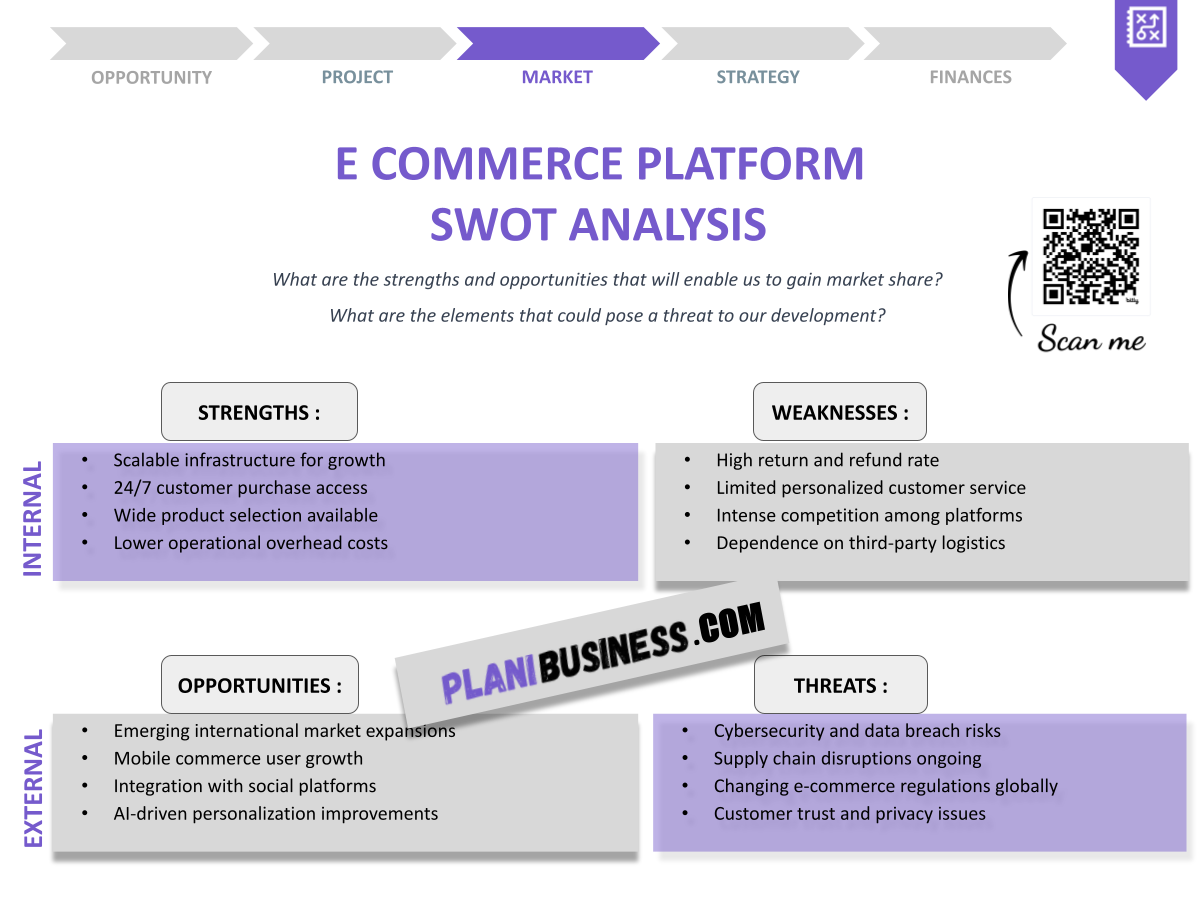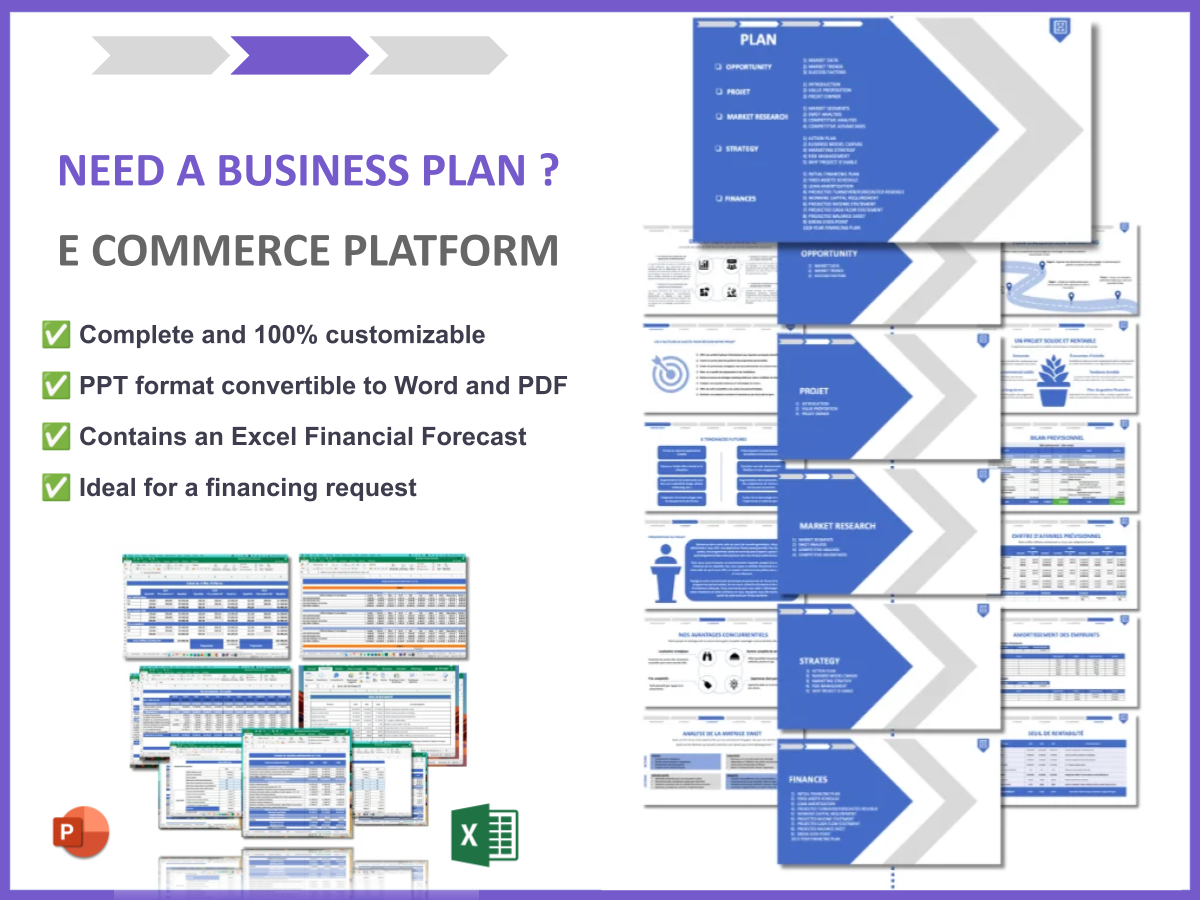Why Should You Have a SWOT Analysis for E-Commerce Platforms?
Are you thinking about launching your own e-commerce platform? You’re not alone! In 2023, over 2.14 billion people are expected to purchase goods and services online, and this number is only set to rise. A SWOT analysis for e-commerce platforms helps you navigate this competitive landscape by identifying your business’s strengths, weaknesses, opportunities, and threats. It’s an essential tool for anyone looking to establish or improve their online business.
A SWOT analysis is a strategic planning tool that allows businesses to evaluate their internal strengths and weaknesses, as well as external opportunities and threats. By understanding these factors, you can make informed decisions that enhance your e-commerce strategy.
- Understanding the importance of SWOT analysis.
- Step-by-step guide on writing a SWOT analysis.
- Examples of successful e-commerce platforms.
- Key strengths of e-commerce businesses.
- Common weaknesses in the e-commerce sector.
- Opportunities for growth in online retail.
- Threats faced by e-commerce companies.
- Detailed SWOT analysis for 10 notable e-commerce platforms.
- Practical tips for conducting your own SWOT analysis.
- Conclusion and next steps for your e-commerce strategy.
How Do You Write a SWOT Analysis for E-Commerce Platforms?
Creating a SWOT analysis for your e-commerce platform involves a structured approach to identifying key factors that will influence your business strategy. Here’s how to break it down:
Strengths
Identify what sets your e-commerce platform apart. This could be a unique product offering, superior customer service, or advanced technology.
Evaluate your brand reputation. A well-established brand can attract more customers and foster loyalty.
Assess your marketing capabilities. Strong digital marketing strategies can drive traffic and increase sales.
Consider your operational efficiency. Efficient processes can reduce costs and improve customer satisfaction.
Weaknesses
Acknowledge the gaps in your product offerings. If you lack variety, you may lose potential sales.
Identify any limitations in your technology. Outdated systems can hinder user experience.
Recognize the challenges in your supply chain. Disruptions can lead to delays and unhappy customers.
Understand your financial constraints. Limited budgets can restrict your growth potential.
Opportunities
Explore emerging markets. Expanding into new regions can open up new customer bases.
Leverage social media trends. Utilizing platforms like Instagram and TikTok can enhance brand visibility.
Consider partnerships with influencers. Collaborations can drive traffic and increase brand credibility.
Investigate technological advancements. Implementing AI and machine learning can enhance customer experience.
Threats
Be aware of increasing competition. New entrants in the market can threaten your market share.
Monitor changes in consumer behavior. Shifts in preferences can impact sales.
Evaluate regulatory challenges. Compliance with laws can require additional resources.
Recognize cybersecurity risks. Data breaches can damage your reputation and customer trust.
SWOT Example N°1 for Amazon
Amazon is a global leader in the e-commerce industry, known for its vast product selection and exceptional customer service. Let’s take a closer look at its SWOT analysis.
| SWOT | Analysis |
|---|---|
| Strengths | Market leader with a strong brand reputation, vast product selection, and efficient logistics. |
| Weaknesses | Thin profit margins and reliance on third-party sellers. |
| Opportunities | Expansion into new markets and sectors, such as grocery and healthcare. |
| Threats | Intense competition from other e-commerce platforms and regulatory scrutiny. |
- Strong brand recognition helps attract customers.
- Advanced logistics system ensures quick delivery.
- Opportunity to leverage technology for better user experience.
- Competition from local and international players is increasing.
Amazon's success stems from its ability to continuously innovate and adapt to market changes. Its robust logistics network gives it a competitive edge, allowing for quick delivery times that customers appreciate. However, the challenge remains to maintain profitability while facing mounting competition from both established and new e-commerce businesses.
SWOT Example N°2 for eBay
eBay is a well-known online marketplace that connects buyers and sellers globally. Here’s a detailed look at its SWOT analysis.
| SWOT | Analysis |
|---|---|
| Strengths | Established brand with a loyal customer base and diverse product offerings. |
| Weaknesses | Inconsistent seller quality and customer service issues. |
| Opportunities | Growing demand for second-hand goods and collectibles. |
| Threats | Competition from larger e-commerce platforms and changing consumer preferences. |
- Diverse product range appeals to a wide audience.
- Strong community of buyers and sellers fosters engagement.
- Opportunity to enhance user experience through better technology.
- Competition from platforms like Amazon and Etsy is fierce.
eBay thrives on its unique marketplace model, allowing users to buy and sell a variety of items, from everyday goods to rare collectibles. However, the platform must address quality control issues among sellers to improve customer satisfaction. By focusing on user experience and leveraging the growing trend for second-hand goods, eBay can solidify its position in the e-commerce sector.
SWOT Example N°3 for Shopify
Shopify is a leading e-commerce platform that enables individuals and businesses to create their own online stores. Here’s a detailed look at its SWOT analysis.
| SWOT | Analysis |
|---|---|
| Strengths | User-friendly interface and a wide range of customizable templates. |
| Weaknesses | Transaction fees for third-party payment gateways can be a drawback. |
| Opportunities | Increasing demand for e-commerce solutions among small businesses. |
| Threats | Growing competition from other e-commerce platforms like WooCommerce and BigCommerce. |
- Strong brand recognition as a go-to platform for online stores.
- Flexible pricing plans cater to different business needs.
- Opportunity to expand integrations with various apps and tools.
- Competition is intensifying, requiring continuous innovation.
Shopify's appeal lies in its simplicity and extensive features that empower users to build their own online stores without technical expertise. The platform's flexible pricing and robust support make it accessible for small to medium-sized businesses. However, Shopify must remain vigilant against the increasing competition in the e-commerce landscape to maintain its leadership position.
SWOT Example N°4 for Etsy
Etsy is a popular online marketplace focused on handmade, vintage, and unique goods. Let’s explore its SWOT analysis.
| SWOT | Analysis |
|---|---|
| Strengths | Strong niche market appeal with a focus on creativity and individuality. |
| Weaknesses | Limited scalability for sellers compared to larger e-commerce platforms. |
| Opportunities | Growing interest in sustainable and artisanal products. |
| Threats | Increased competition from mainstream e-commerce sites offering similar products. |
- Unique offerings attract a dedicated customer base.
- Community-driven platform fosters engagement and loyalty.
- Opportunity to expand marketing efforts to reach broader audiences.
- Vulnerability to competition from larger platforms can impact growth.
Etsy thrives on its unique selling proposition of connecting artisans and creators with consumers seeking one-of-a-kind items. The platform has cultivated a loyal community that values creativity and sustainability. However, as larger e-commerce platforms begin to offer similar handmade products, Etsy must innovate to retain its market share and continue to support its sellers.
SWOT Example N°5 for Walmart
Walmart is one of the largest retail corporations in the world, with a growing presence in the e-commerce sector. Here’s an overview of its SWOT analysis.
| SWOT | Analysis |
|---|---|
| Strengths | Extensive distribution network and strong brand recognition. |
| Weaknesses | Perceived as a low-cost retailer, which can impact profit margins. |
| Opportunities | Expansion of online grocery shopping and delivery services. |
| Threats | Intense competition from other e-commerce giants like Amazon. |
- Strong logistics and supply chain management enhance efficiency.
- Ability to leverage physical stores for online fulfillment.
- Opportunity to innovate in customer service and technology.
- Pressure from competitors may affect pricing strategies.
Walmart's dominance in the retail space translates well into its e-commerce efforts. With a vast network of stores, Walmart can offer same-day delivery and pickup options, catering to modern consumer needs. However, the company faces challenges in maintaining profitability while competing against aggressive players like Amazon, necessitating continuous innovation and adaptation.
SWOT Example N°6 for Alibaba
Alibaba is a leading player in the global e-commerce market, particularly in Asia. Here’s a closer look at its SWOT analysis.
| SWOT | Analysis |
|---|---|
| Strengths | Dominant position in the Chinese market with a vast user base. |
| Weaknesses | Dependence on the Chinese market makes it vulnerable to local regulations. |
| Opportunities | Expansion into international markets and growing demand for online retail. |
| Threats | Regulatory scrutiny and competition from both domestic and international players. |
- Strong brand presence in Asia facilitates customer trust.
- Diverse business model, including cloud computing and digital media.
- Opportunity to capitalize on the rise of cross-border e-commerce.
- Regulatory challenges may impact future growth strategies.
Alibaba's extensive ecosystem of services beyond just e-commerce gives it a competitive edge, allowing for diverse revenue streams. The company's growth potential is significant as it seeks to expand its footprint globally, but it must navigate regulatory hurdles and fierce competition to maintain its leadership position in the e-commerce landscape.
SWOT Example N°7 for Target
Target is a well-known retail chain that has successfully expanded into the e-commerce market. Here’s a detailed look at its SWOT analysis.
| SWOT | Analysis |
|---|---|
| Strengths | Strong brand loyalty and a wide range of product offerings. |
| Weaknesses | Limited international presence compared to competitors. |
| Opportunities | Growth in online shopping and enhancement of delivery services. |
| Threats | Intense competition from other e-commerce platforms like Amazon and Walmart. |
- Effective marketing strategies drive customer engagement.
- Ability to leverage physical stores for online orders.
- Opportunity to expand product lines and exclusive brands.
- Competition requires continuous innovation and adaptation.
Target's successful integration of its brick-and-mortar and e-commerce operations allows it to offer a seamless shopping experience. The company has a strong brand presence, which enhances customer loyalty. However, as competition intensifies, Target must focus on improving its online capabilities and expanding its reach to maintain its market position in the e-commerce sector.
SWOT Example N°8 for Zalando
Zalando is a leading European online fashion retailer known for its extensive selection of clothing and accessories. Here’s an overview of its SWOT analysis.
| SWOT | Analysis |
|---|---|
| Strengths | Strong brand recognition in the European fashion market. |
| Weaknesses | High return rates associated with fashion items. |
| Opportunities | Expansion into new markets and increasing demand for online fashion shopping. |
| Threats | Intense competition from other fashion retailers and potential economic downturns. |
- Diverse product range appeals to various consumer preferences.
- Strong online presence enhances visibility and reach.
- Opportunity to innovate in personalized shopping experiences.
- Economic fluctuations may impact consumer spending on fashion.
Zalando's focus on providing a wide range of fashion products has solidified its position in the e-commerce landscape. The company benefits from a strong brand and growing market demand. However, it must address the challenge of high return rates and remain competitive against other e-commerce platforms to sustain its growth and profitability.
SWOT Example N°9 for Wayfair
Wayfair is a prominent online retailer specializing in home goods and furniture. Here’s a detailed look at its SWOT analysis.
| SWOT | Analysis |
|---|---|
| Strengths | Extensive product selection and a user-friendly shopping experience. |
| Weaknesses | High shipping costs and long delivery times can deter customers. |
| Opportunities | Growing trend in home improvement and online furniture shopping. |
| Threats | Intense competition from both online and traditional furniture retailers. |
- Strong marketing strategies enhance brand visibility.
- Opportunity to improve logistics and reduce shipping times.
- Diverse range of products attracts a wide customer base.
- Competition from established players can impact market share.
Wayfair's strength lies in its vast selection of home goods and commitment to customer satisfaction. The company has successfully captured the online furniture market but faces challenges regarding shipping costs and delivery speed. By focusing on improving logistics and leveraging the growing interest in home improvement, Wayfair can further solidify its position in the e-commerce sector.
SWOT Example N°10 for Chewy
Chewy is a leading online retailer for pet food and supplies, known for its exceptional customer service. Here’s an overview of its SWOT analysis.
| SWOT | Analysis |
|---|---|
| Strengths | Strong customer loyalty and personalized shopping experiences. |
| Weaknesses | High dependence on a limited product range compared to larger retailers. |
| Opportunities | Expansion into new pet-related products and services. |
| Threats | Competition from other e-commerce platforms and traditional pet supply stores. |
- Exceptional customer service fosters strong brand loyalty.
- Opportunity to diversify product offerings beyond food and supplies.
- Engagement with pet owners through community-building efforts.
- Competitive pressures require continuous innovation.
Chewy has carved a niche in the e-commerce market by focusing on pet owners' needs and providing unparalleled customer service. The company enjoys a loyal customer base but must navigate the challenges of competition and limited product diversity. By expanding its offerings and enhancing its community engagement, Chewy can continue to thrive in the growing pet supply industry.
Conclusion
In conclusion, conducting a SWOT analysis for your e-commerce platform is a crucial step in understanding your business landscape. By identifying your strengths, weaknesses, opportunities, and threats, you can make informed decisions that lead to long-term success. For those looking to take their e-commerce journey to the next level, consider utilizing a comprehensive business plan template for E Commerce Platform that can guide you through the essential components of launching and managing your online business.
Additionally, if you are just starting out, check out our article on How to Begin an E Commerce Platform? This resource provides valuable insights into the foundational steps needed to establish your online presence. Moreover, to enhance your marketing efforts, be sure to read our article on How to Formulate an E Commerce Platform Marketing Plan? With Example to develop effective strategies tailored to your target audience.
Frequently Asked Questions
What is a SWOT analysis in the context of e-commerce?
A SWOT analysis in e-commerce refers to a strategic evaluation of a business’s strengths, weaknesses, opportunities, and threats that affect its online operations.
Why is it important to conduct a SWOT analysis for an e-commerce platform?
Conducting a SWOT analysis is essential for identifying critical factors that can influence your e-commerce strategy and help in making informed business decisions.
How often should I perform a SWOT analysis for my e-commerce business?
It is advisable to conduct a SWOT analysis annually or whenever significant changes occur within your business or the broader market.
Can small businesses benefit from a SWOT analysis?
Absolutely! A SWOT analysis can provide valuable insights for businesses of all sizes, helping them to strategize effectively in the e-commerce landscape.
What are common weaknesses found in e-commerce businesses?
Common weaknesses may include limited brand recognition, outdated technology, and challenges in supply chain management.
How can I identify opportunities in my e-commerce sector?
Opportunities can be identified through thorough market research, analysis of trends, and gathering feedback from customers.
What threats should I be aware of in the e-commerce industry?
Threats include increasing competition, shifts in consumer behavior, and potential regulatory changes affecting online sales.
Are there tools available to help with SWOT analysis?
Yes, various tools such as SWOT templates, mind mapping software, and collaboration tools can enhance the process of conducting a SWOT analysis.
How can I implement the findings from my SWOT analysis?
Implement findings by developing actionable strategies that leverage your strengths and opportunities while addressing your weaknesses and threats.
What resources can help improve my e-commerce platform?
Resources such as articles, business plan templates, and marketing guides can provide valuable insights and strategies for enhancing your e-commerce platform.







